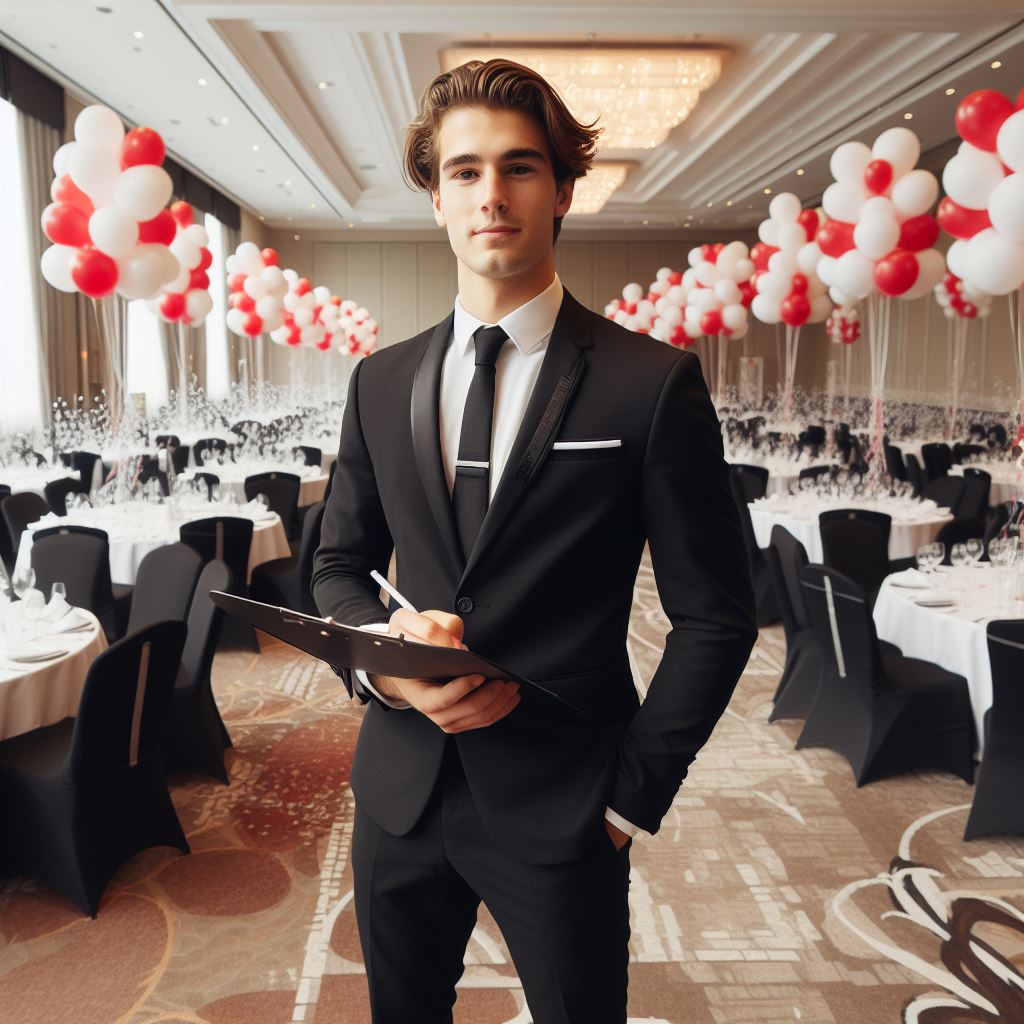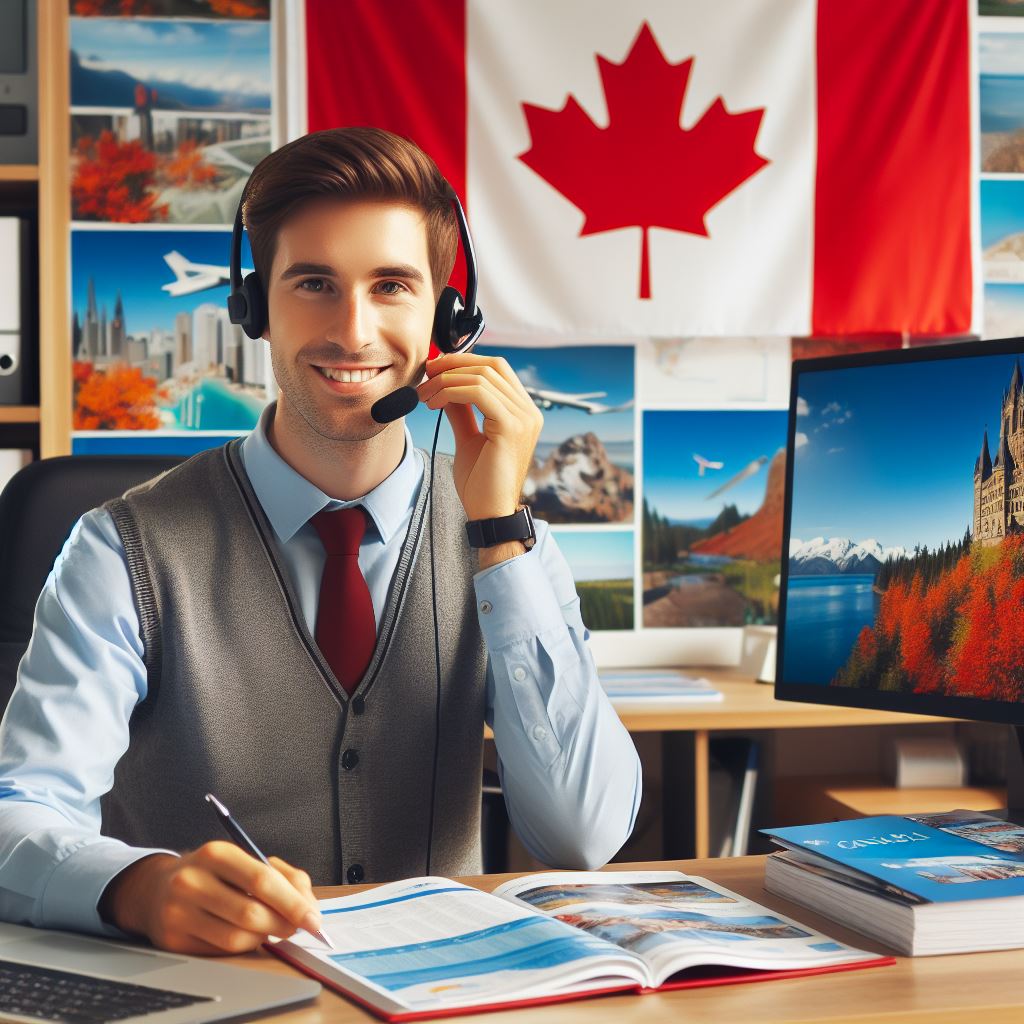Introduction
Explore the intricate art of Canadian event planning as we delve into the symbiotic relationship between event planners and vendors.
The role and significance of event planners in Canada
In Canada, event planners play a vital role in organizing and executing successful events.
They are responsible for coordinating all aspects, from venue selection to budgeting, marketing to logistics.
Event planners understand the importance of working with vendors to ensure a seamless experience for their clients.
Working with vendors is crucial because they provide the necessary resources and expertise needed to bring an event to life.
Vendors offer a range of services such as catering, entertainment, audiovisual equipment, and decorations.
By collaborating with vendors, event planners can tap into their knowledge and network, resulting in a more efficient and cost-effective event.
When event planners work closely with vendors, they can communicate their vision and requirements, ensuring that vendors are aligned with their clients’ expectations.
This collaboration allows for customization and personalization, resulting in a unique and memorable event experience.
Overview of the topic
Additionally, event planners rely on vendors for their professionalism and reliability.
They expect vendors to deliver high-quality products and services, meet deadlines, and handle any unforeseen challenges that may arise.
Establishing strong relationships with vendors is essential to building trust and ensuring smooth cooperation throughout the planning process.
In essence, event planners in Canada highly value the collaboration with vendors.
They recognize the significance of working together to create exceptional events that meet their clients’ objectives and exceed expectations.
By leveraging the expertise and resources provided by vendors, event planners can deliver outstanding results in the ever-evolving world of event planning.
The Role of Vendors in Event Planning
Definition of vendors and their significance in event planning
Vendors refer to individuals or companies that provide products or services for events.
They play a crucial role in event planning, as they contribute to the overall success and execution of an event.
Vendors are responsible for supplying various resources and expertise that event planners may not possess.
They can provide everything from food and beverages to equipment and decorations.
The significance of vendors in event planning cannot be underestimated.
They help bring the event vision to life and contribute to the overall experience and satisfaction of attendees.
The types of vendors commonly involved in events (caterers, decorators, AV technicians, etc.)
When it comes to events, there are several types of vendors that event planners commonly work with.
These vendors specialize in different areas and bring specific skills and resources to the table.
One of the most common types of vendors in event planning is caterers.
They are responsible for providing food and beverages for the event.
Unlock Your Career Potential
Visualize a clear path to success with our tailored Career Consulting service. Personalized insights in just 1-3 days.
Get StartedCaterers bring experience in menu planning, food preparation, and serving, ensuring that guests are well-fed and satisfied.
Decorators are another important type of vendor.
They specialize in transforming event spaces through creative and aesthetically pleasing designs.
Decorators bring a sense of ambiance and visual appeal to the event, enhancing the overall experience for attendees.
AV technicians are vendors who handle audiovisual aspects of an event.
They are responsible for setting up and operating sound systems, projectors, lighting, and other technical equipment.
AV technicians ensure that all audio and visual components of the event run smoothly and enhance the overall atmosphere.
Other types of vendors commonly involved in events include photographers, florists, event planners, rental companies, and entertainment providers.
Each vendor brings their expertise and resources to contribute to the success of an event.
Importance of establishing positive relationships with vendors for successful event execution
Establishing positive relationships with vendors is crucial for event planners to ensure the successful execution of an event.
Strong relationships can lead to better communication, understanding, and collaboration.
When event planners have a positive relationship with vendors, they can convey their vision more effectively and ensure that vendors understand their needs and expectations.
This helps in aligning the vendor’s services with the event planner’s vision.
Effective communication between event planners and vendors is essential for seamless event execution.
By building relationships based on trust and open communication, event planners can minimize misunderstandings and potential issues.
Additionally, positive relationships with vendors can lead to better pricing and availability of resources.
Vendors are more likely to provide competitive pricing and prioritize their services for event planners they have established good relationships with.
Furthermore, vendors with whom event planners have positive relationships are more likely to go the extra mile to ensure the success of an event.
They may be more willing to accommodate last-minute requests or provide extra support and resources when needed.
IEssentially, vendors play a vital role in event planning, bringing their expertise and resources to contribute to the success of an event.
Event planners should prioritize establishing positive relationships with vendors to ensure effective communication, better pricing, and overall successful event execution.
Read: Eco-Friendly Event Planning Ideas in Canada
Finding and Selecting Vendors
Researching and identifying potential vendors
Finding the right vendors for your event starts with thorough research and identification of potential options.
Determining the needs and requirements of the event
Clearly defining the needs and requirements of your event is essential in selecting the most suitable vendors.
Evaluating vendors based on their experience, quality, availability, and pricing
When evaluating potential vendors, consider their experience, quality of work, availability, and pricing to make an informed decision.
Making initial contact and conducting interviews or consultations with potential vendors
Reach out to selected vendors, set up interviews or consultations to further assess their abilities and compatibility with your event.
Finalizing vendor selection based on a combination of factors
After considering all factors, make a final decision on vendor selection that aligns with your event’s needs and budget.
Read: How to Start Your Event Planning Business in Canada
Negotiating Contracts and Agreements
Importance of formal agreements with vendors
- Formal agreements with vendors are crucial for establishing clear expectations and responsibilities.
- These agreements help protect both event planners and vendors from misunderstandings or conflicts.
- Without a formal agreement, there is a higher risk of incomplete services or disputes over payment.
- Vendors are more likely to uphold their commitments when a formal contract is in place.
- Formal agreements also provide legal protection in case of breach of contract or other issues.
Elements to consider in vendor contracts (services provided, pricing, payment terms, cancellation policies, etc.)
- Clearly define the scope of services the vendor will provide for the event.
- Include specific details about the quality and quantity of goods or services being offered.
- Agree on a fair pricing structure that is mutually beneficial for both parties.
- Specify payment terms, including due dates, accepted methods of payment, and late payment penalties.
- Establish clear cancellation policies and procedures to avoid unnecessary financial losses.
Negotiating contracts to ensure fair terms and protection for both parties
- Prepare for negotiation by gathering information about the vendor, their services, and industry standards.
- Clearly communicate your expectations and desired terms to the vendor during negotiations.
- Be open to compromises and find a middle ground that benefits both the event planner and the vendor.
- Consider seeking legal advice or assistance when negotiating complex or high-value contracts.
- Document any agreed-upon changes or concessions made during the negotiation process.
- Ensure that all parties involved sign the final contract to make it legally binding.
Reviewing and revising contracts to address specific event needs
- Regularly review vendor contracts to ensure they still align with your event requirements and goals.
- Update contracts to account for any changes in services, pricing, or event logistics.
- Address any specific event needs, such as venue requirements, transportation, or additional services.
- Consult with vendors to discuss any necessary revisions or modifications to the existing contract.
- Keep records of all contract revisions and ensure that all parties approve and sign off on changes.
Furthermore, Negotiating contracts and agreements with vendors is a vital aspect of event planning.
Formal agreements establish clear expectations and protect both parties involved.
When negotiating contracts, it is important to consider various elements such as services provided, pricing, payment terms, and cancellation policies.
Negotiations should aim to create fair terms and ensure mutual protection.
To begin negotiations, event planners should gather information about the vendor and industry standards. Clear communication of expectations and desired terms is crucial.
Being open to compromises can lead to a mutually beneficial outcome.
Seeking legal advice or assistance may be necessary for complex contracts.
Once negotiations are complete, it is essential to document any agreements made.
Signing the final contract makes it legally binding.
Event planners should regularly review and revise contracts to address any changes in event needs.
Updating contracts to reflect new services, pricing, or logistics is necessary for maintaining a successful relationship with vendors.
In essence, successful event planning relies heavily on negotiating contracts and agreements with vendors.
Formal agreements are important for establishing clear expectations and protecting both parties.
Considering essential elements in vendor contracts, negotiating fair terms, and regularly reviewing and revising contracts are key practices for event planners.
By prioritizing effective contract negotiations, event planners can ensure successful and smooth vendor relationships.
Read: Event Planning 101: Certification in Canada Explained
Collaborating with Vendors for Event Success
Importance of effective communication with vendors throughout the planning process
During the event planning process, effective communication with vendors is crucial for success.
Without clear and open lines of communication, important details and requirements may be missed, leading to a breakdown in the event execution.
Not only does effective communication allow event planners to convey their vision and requirements to vendors, but it also enables vendors to provide valuable input, suggest alternatives, and offer their expertise.
This collaboration can lead to more innovative and successful events.
Establishing clear expectations and objectives with vendors
To ensure that vendors understand the goals and requirements of an event, it is essential to establish clear expectations and objectives from the beginning.
This includes providing vendors with detailed information about the event theme or concept, desired outcomes, budget limitations, and any specific preferences or constraints.
By clearly defining what is expected from vendors, event planners can minimize misunderstandings and potential conflicts.
This clarity also enables vendors to align their services and offerings with the event’s objectives, resulting in a more cohesive and satisfying outcome for all parties involved.
Regularly checking in with vendors to ensure progress and address any changes or issues
Throughout the planning process, event planners must maintain regular communication with vendors to monitor progress, address any changes that may arise, and promptly resolve any potential issues.
Regular check-ins help keep everyone on the same page and ensure that tasks are completed according to schedule.
Timely communication allows event planners to address any unanticipated challenges promptly.
It also enables vendors to provide updates, seek clarification, and make necessary adjustments to their services.
By addressing any changes or issues promptly, event planners can avoid last-minute complications and maintain the smooth progress of the event planning process.
Coordinating vendors’ schedules and responsibilities to avoid conflicts and ensure smooth operations
Event planners play a crucial role in coordinating vendors’ schedules and responsibilities to prevent conflicts and ensure seamless operations.
This involves creating a comprehensive timeline that outlines each vendor’s tasks, deadlines, and key milestones.
By coordinating vendors’ schedules, event planners can identify potential overlaps or bottlenecks in their activities.
This allows them to make necessary adjustments to avoid conflicts and ensure that all aspects of the event run smoothly.
Effective coordination ensures that vendors have sufficient time to set up, deliver their services, and clean up after the event, resulting in a stress-free experience for everyone involved.
Building and maintaining positive relationships with vendors for future collaborations
Beyond individual events, building and maintaining positive relationships with vendors is essential for event planners.
Cultivating strong relationships with vendors can lead to long-term partnerships, increased trust, and improved collaboration in future events.
Maintaining open and respectful communication, prompt payment, and honoring commitments contribute to fostering positive relationships with vendors.
Additionally, expressing gratitude and recognizing vendors’ efforts and contributions can further strengthen these relationships.
Ultimately, a solid vendor network can provide event planners with reliable and talented professionals who can consistently deliver high-quality services, ensuring the success of future events.
To wrap it up, collaborating effectively with vendors is crucial for event success.
By prioritizing effective communication, establishing clear expectations, regularly checking in, coordinating schedules, and building positive relationships, event planners can ensure a seamless planning process and achieve their desired outcomes.
Read: Corporate vs. Social Event Planning in Canada

Handling Challenges and Adapting to Vendor-related Issues
Common challenges in working with vendors (scheduling conflicts, quality issues, communication breakdowns, etc.)
1. Scheduling conflicts
- Ensure clear communication of event dates and deadlines to minimize conflicts.
- Establish realistic timelines with vendors to prevent scheduling difficulties.
- Keep alternative options available in case of unexpected scheduling conflicts.
2. Quality issues
- Thoroughly research and vet vendors to ensure they meet your quality standards.
- Clearly communicate your expectations and requirements to avoid subpar deliverables.
- Regularly communicate with vendors to address any emerging quality concerns promptly.
3. Communication breakdowns
- Maintain open and regular lines of communication with vendors to prevent misunderstandings.
- Ensure there are designated points of contact for efficient communication channels.
- Use various communication methods (e.g., email, phone calls, in-person meetings) to ensure clarity.
Strategies for handling challenges and maintaining professionalism
1. Stay calm and composed
- Take a deep breath and remain calm to approach challenges with a level-headed mindset.
- Avoid reacting impulsively and maintain a professional demeanor even in stressful situations.
- Focus on finding solutions rather than dwelling on the challenges encountered.
2. Effective problem-solving
- Analyze the root cause of the challenge and brainstorm potential solutions.
- Collaborate with vendors to find mutually beneficial resolutions.
- Prioritize finding solutions that align with the overall event objectives and client’s satisfaction.
3. Open and honest communication
- Clearly express concerns and challenges to vendors without being confrontational.
- Listen actively to the vendor’s perspective and work towards understanding each other’s viewpoints.
- Maintain a professional and respectful tone while discussing and resolving issues.
Being adaptable and resourceful in finding solutions to unexpected vendor-related issues
1. Quick thinking and flexibility
- Embrace a flexible mindset to adapt to unforeseen challenges that vendors might encounter.
- Quickly assess alternative options and develop contingency plans when issues arise.
- Seek creative solutions by leveraging your network and available resources.
2. Building strong relationships
- Cultivate positive relationships with vendors to establish trust and open lines of communication.
- Regularly assess their performance and address any concerns promptly and constructively.
- Collaborate with vendors to learn from past challenges and improve future working dynamics.
3. Continuous learning and improvement
- Reflect on challenges faced and identify areas for improvement in vendor selection and management.
- Stay updated with industry best practices and implement them in vendor interactions.
- Foster a culture of learning and growth for both yourself and the vendors you work with.
Generally, working with vendors in event planning comes with its challenges, such as scheduling conflicts, quality issues, and communication breakdowns.
However, by employing strategies including effective communication, problem-solving, and adaptability, these challenges can be successfully overcome while maintaining professionalism.
Remember, building strong relationships and continuously learning will enhance vendor management skills and ensure successful event execution.
Conclusion
Recap of the significance of working with vendors in Canadian event planning
Throughout this blogpost, we have explored the vital role that vendors play in the success of Canadian events.
From providing necessary supplies and services to contributing to the overall atmosphere and experience, vendors are an integral part of event planning.
Final thoughts on the importance of building and maintaining positive relationships with vendors
Building and maintaining positive relationships with vendors is crucial for event planners.
By cultivating trust, open communication, and mutual respect, event planners can ensure smooth operations, reliability, and the ability to negotiate favorable terms in future collaborations.
Encouragement for event planners to continuously improve vendor management skills for successful events
As event planning professionals, it is essential to continuously strive for improvement in vendor management skills.
This includes expanding vendor networks, seeking feedback, and keeping up with industry trends and best practices.
By doing so, event planners can enhance their event planning capabilities and deliver even more successful and memorable events for their clients and attendees.




